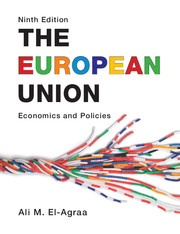Book contents
- Frontmatter
- Contents
- Figures
- Tables
- Boxes
- Contributors
- Preface
- A reader’s guide
- Abbreviations
- 1 General introduction
- Part I EU history, institutions and legal dimension
- Part II EU market integration
- Part III EU monetary integration
- Part IV The single European market
- Part V EU budget and structural policies
- 19 The general budget
- 20 The Common Agricultural Policy
- 21 The Common Fisheries Policy
- 22 Regional policy
- 23 Social policies
- Part VI EU external relations
- Part VII The future of the EU
- Bibliography
- Author Index
- Index
- References
20 - The Common Agricultural Policy
from Part V - EU budget and structural policies
- Frontmatter
- Contents
- Figures
- Tables
- Boxes
- Contributors
- Preface
- A reader’s guide
- Abbreviations
- 1 General introduction
- Part I EU history, institutions and legal dimension
- Part II EU market integration
- Part III EU monetary integration
- Part IV The single European market
- Part V EU budget and structural policies
- 19 The general budget
- 20 The Common Agricultural Policy
- 21 The Common Fisheries Policy
- 22 Regional policy
- 23 Social policies
- Part VI EU external relations
- Part VII The future of the EU
- Bibliography
- Author Index
- Index
- References
Summary
Introduction
Unlike other regional blocs, the European Union (EU) extends free trade between its member states (MSs) to agriculture and agricultural products. Agricultural products are defined (in both the 1975 Treaty of Rome, creating the European Economic Community, EEC, and 2009 Treaty of Lisbon, formally the Treaty on the Functioning of the European Union, TFEU, Article 38.1) as those of the soil, stock-farming and fisheries, as well as those of first-stage processing directly related to them, although fisheries has developed into a policy of its own, the Common Fisheries Policy (CFP; see Chapter 21). Moreover, both treaties dictate that the operation and development of the common market for agricultural products should be accompanied by the establishment of a Common Agricultural Policy (CAP) among MSs.
One could ask why, in 1957, were the common market arrangements extended to agriculture? Or why agriculture (together with transport) was singled out for special treatment? Such questions are to some extent irrelevant. As mentioned in Chapter 1 (Chapter 1, Section 1.2, page 1), Article XXIV of the General Agreement on Tariffs and Trade (GATT, now managed by the World Trade Organization, WTO) dictates that duties and other restrictive regulations of commerce should be eliminated with respect to substantially all the trade between the constituent territories of a regional bloc. Since agricultural trade constituted a substantial part of the total trade of the founding MSs, especially in the case of France, it should be quite obvious that excluding agriculture from EEC arrangements would have been in direct contradiction of this requirement (see Section 20.2). Moreover, free agricultural trade would have been to no avail if each MS continued to protect agriculture in its own way (see Section 20.3), since that would likely have amounted to the replacing of tariffs with non-tariff trade barriers (NTBs; see Chapter 1) and might also have conflicted with EEC competition rules (see Chapter 13). In any case, an economic integration arrangement that excluded agriculture had a zero success chance. This is because the EEC Treaty represented a delicate balance of national interests of the contracting parties: West Germany favoured free trade in industrial goods since there lay its strength, while France was inclined towards agriculture, given its relative efficiency in the sector.
- Type
- Chapter
- Information
- The European UnionEconomics and Policies, pp. 306 - 334Publisher: Cambridge University PressPrint publication year: 2011
References
- 1
- Cited by



